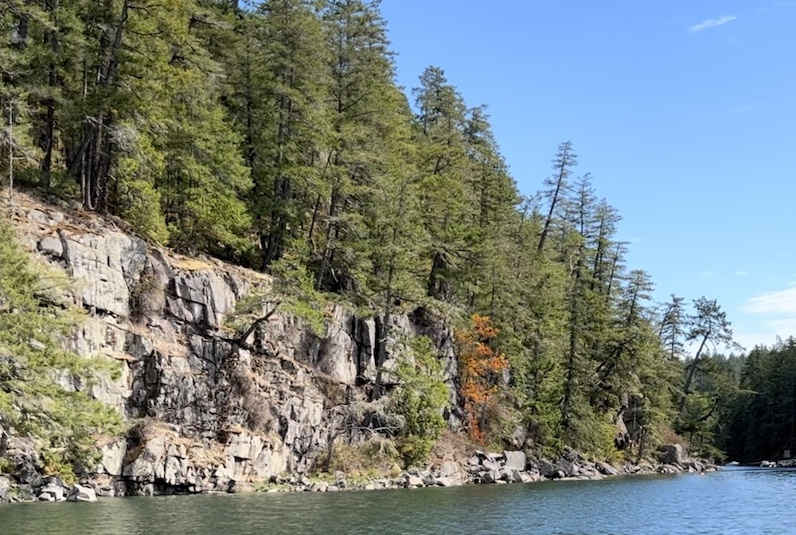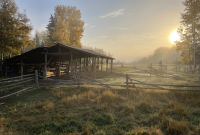Support strong Canadian climate journalism for 2025
A joint partnership has protected more than 250 acres of previously privately-owned land on the Salish Sea, saving beloved natural areas in B.C.’s coastal communities.
The B.C. Parks Foundation, Environment and Climate Change Canada and the Wilson 5 Foundation came together to acquire lands, including in the rare Coastal Douglas fir forest ecosystem on the Sunshine Coast known to be endangered since the 1990’s.
About 80 per cent of this ecosystem is privately owned, and B.C. Parks Foundation says it is critical to acquire lands as they become available to prevent logging companies and developers from destroying them.
“In almost all cases ... waterfront lands and islands, really rich places end up getting developed,” says Andrew Day, CEO of the B.C. Parks Foundation.
“It might take two months, it might take 20 years, but the pattern is pretty clear: Almost always, places end up either developed or logged.”
The lands will be protected in perpetuity, because even if the foundation dissolves, the lands would be passed to another charity with similar purpose.
“Protecting these unique ecosystems is about more than just conservation; it’s about ensuring that future generations can experience the beauty and movement these lands offer,” wrote Chip and Summer Wilson of the Wilson 5 Foundation and Lululemon Athletica in an email statement to Canada’s National Observer.
Once lands are acquired by the foundation, they are leased to groups for management to ensure conservation, protection and create research opportunities on 99-year lease agreements. Management groups can include B.C. Parks, municipalities and First Nations.
“This is just the beginning. Our collaboration with the B.C. Parks Foundation has shown what’s possible, but there’s a lot more that needs to be done. We’re dedicated to working with Indigenous groups and government to ensure these vital landscapes are protected,” the Wilsons wrote.
The B.C. Parks Foundation’s work with First Nations is a big reason why Alda Grames, who has been on the Sunshine Coast Regional District advisory plan commission for 26 years, chose the foundation as the beneficiary of her 32 acres of Coastal Douglas-fir old-growth land.
Grames is a longtime environmental activist who stewarded her property, which has comprised most of the undeveloped shoreline on Secret Cove’s northern coast, for nearly 50 years. Her kids, grandkids and great-grandchild have all grown up enjoying the unique, biodiverse ecosystem. Now, she has the confirmation it will be protected — as she has done for the last half a century — for years to come.
“It means so much. They were brought up here, so they've walked all that property … and it's been part of their life since 1976 when we moved here,” said Grames. “There's a lot of gratefulness.”
The lands also mean a lot to the community of Secret Cove on the Sunshine Coast, whose storied history of protecting these lands from logging and development goes back decades, including in the 1990’s when petitions and protests were sparked to prevent the logging of the area.
She hopes her actions will motivate other owners of undeveloped land to do the same.
“It's impossible to express how much it means to me,” said Grames. “It's part of my heart and soul … having it be protected in perpetuity is most important, because a family can't do that, it's almost impossible for a private person, and we all pass away, but with that promise of protection in perpetuity, [that] was a deciding factor.”
Grames got in touch with the foundation through volunteer Bill Henwood, a retiree from Parks Canada whose four years of investigation and persistence — “identifying opportunities for conservation,” he said — led to other lands in the area being protected.
When he was out paddling his kayak around Smuggler Cove Marine Provincial Park, he realized some of the land he was paddling past near Jeddah Point was not part of the park, but was privately owned.
He said the discovery was “a bit unnerving, because if the private owner were to decide to develop it or sell it to someone who did want to develop it, we would have lost a major jewel.”
Thus, when the B.C. Parks Foundation was founded, he suggested the land be on their list to acquire. “So it came to be,” Henwood noted.
Another owner, who will remain anonymous, donated the 10-acre Marine Island and saw the completion of his land and legacy being protected forever through the foundation just shortly before he passed away, says Day.
“It's really about teamwork: everybody plays a part, and it may be a small part, but every part is really critical,” said Day. “There's a kind of this wonderful magic that's happening in B.C. of all of these different people and very unlikely candidates. ...What I find the most inspiring is how there's all these small parts, and how do they all add up.”






Comments